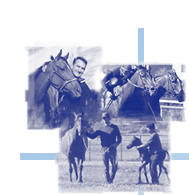|
I�ve noticed that some racing
stables are licensed as a LLC (Limited Liability Corporation). Are
LLC�s in the racing industry given the same protections as other
LLC�s?
LLC�s are like corporations in that
they protect the owners from liability as long as certain criteria are
met in the formation and operation of the LLC. Namely, it is important
that the LLC is adequately capitalized, properly insured, that the LLC
officers have regular meetings, that minutes are kept for these
meetings*, and that the LLC funds are not co-mingled. If these criteria
are not met the �corporate veil� which normally protects the owners
may be pierced leaving the owners potentially personally liable for the
LLC debt or obligation.
Often, LLC�s are formed with the sole asset being a single racehorse.
If, for example, that horse becomes injured and substantial veterinarian
bills are incurred, there may be some potential liability exposure to
the owners even with the LLC structure in place.
Further complications arose with LLC liability since until
recently the California Horse Racing Board rules failed to recognize
LLC�s. This created opportunities for argument that LLC�s in the
racing industry should be treated as general partnerships leaving the
owners vulnerable to personal liability. On September 13, 1998, and at
the urging of TOC, the CHRB rules 1505 (2) and 1506 were amended to
recognize LLC�s.
In this writer�s opinion, LLC�s should soon replace
partnerships as the most ideal method for horse ownership in our
industry. LLC�s better provide limited liability to all owners, like
corporations. Unlike corporations, however, LLC�s are taxed favorably
like partnerships. Furthermore, like partnerships, LLC�s allow
flexible income allocation structures for unequal portions of stable or
horse ownership. Finally, unlike limited partnerships, several or all of
the owners can fully participate in the management of the stable or
horse without incurring personal liability for obligations incurred by
the LLC.
To properly set up an LLC is relatively simple. In
California, the owners must enter into an �Operating Agreement�
which is similar to a partnership agreement. Next, they must file an
�Articles of Organization� form along with a $70.00 filing fee and
an $800 Franchise Fee with the Secretary of State. Finally, a �Stable
Name Application� along with Articles of Organization�s title page
and $300 filing fee, must be submitted to the CHRB.
* Note: While insurance, regular
meetings, and minutes are not required to establish and operate a LLC,
the writer recommends them.
(This article first appeared in
the April 1999 issue of Owner's Circle and is reprinted
with permission of Thoroughbred
Owners of California )
Back
to main Articles Page

|

